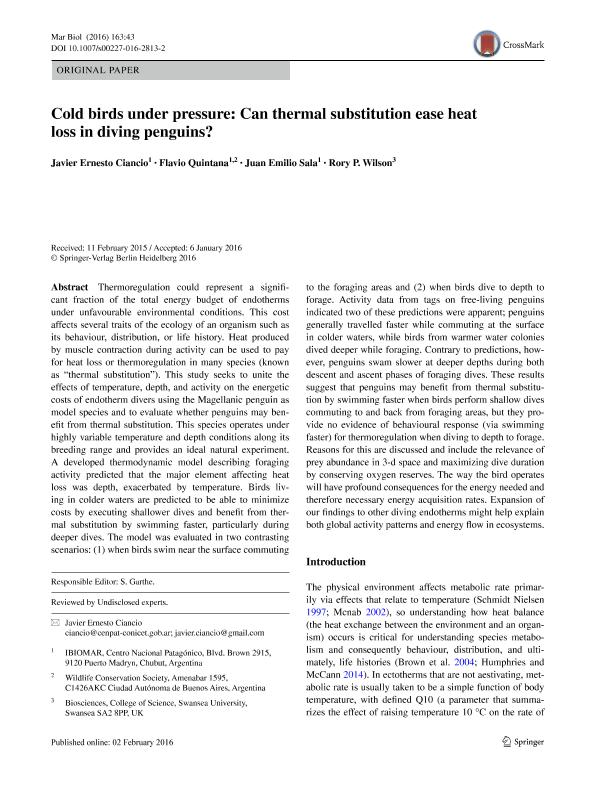Mostrar el registro sencillo del ítem
dc.contributor.author
Ciancio Blanc, Javier Ernesto

dc.contributor.author
Quintana, Flavio Roberto

dc.contributor.author
Sala, Juan Emilio

dc.contributor.author
Wilson, Rory P

dc.date.available
2018-02-22T15:18:48Z
dc.date.issued
2016-02
dc.identifier.citation
Ciancio Blanc, Javier Ernesto; Quintana, Flavio Roberto; Sala, Juan Emilio; Wilson, Rory P; Cold birds under pressure: Can thermal substitution ease heat loss in diving penguins?; Springer; Marine Biology; 163; 2; 2-2016; 1-15
dc.identifier.issn
0025-3162
dc.identifier.uri
http://hdl.handle.net/11336/36965
dc.description.abstract
Thermoregulation could represent a significant fraction of the total energy budget of endotherms under unfavourable environmental conditions. This cost affects several traits of the ecology of an organism such as its behaviour, distribution, or life history. Heat produced by muscle contraction during activity can be used to pay for heat loss or thermoregulation in many species (known as “thermal substitution”). This study seeks to unite the effects of temperature, depth, and activity on the energetic costs of endotherm divers using the Magellanic penguin as model species and to evaluate whether penguins may benefit from thermal substitution. This species operates under highly variable temperature and depth conditions along its breeding range and provides an ideal natural experiment. A developed thermodynamic model describing foraging activity predicted that the major element affecting heat loss was depth, exacerbated by temperature. Birds living in colder waters are predicted to be able to minimize costs by executing shallower dives and benefit from thermal substitution by swimming faster, particularly during deeper dives. The model was evaluated in two contrasting scenarios: (1) when birds swim near the surface commuting to the foraging areas and (2) when birds dive to depth to forage. Activity data from tags on free-living penguins indicated two of these predictions were apparent; penguins generally travelled faster while commuting at the surface in colder waters, while birds from warmer water colonies dived deeper while foraging. Contrary to predictions, however, penguins swam slower at deeper depths during both descent and ascent phases of foraging dives. These results suggest that penguins may benefit from thermal substitution by swimming faster when birds perform shallow dives commuting to and back from foraging areas, but they provide no evidence of behavioural response (via swimming faster) for thermoregulation when diving to depth to forage. Reasons for this are discussed and include the relevance of prey abundance in 3-d space and maximizing dive duration by conserving oxygen reserves. The way the bird operates will have profound consequences for the energy needed and therefore necessary energy acquisition rates. Expansion of our findings to other diving endotherms might help explain both global activity patterns and energy flow in ecosystems.
dc.format
application/pdf
dc.language.iso
eng
dc.publisher
Springer

dc.rights
info:eu-repo/semantics/openAccess
dc.rights.uri
https://creativecommons.org/licenses/by-nc-sa/2.5/ar/
dc.subject
Bioenergetics
dc.subject
Heat Balance
dc.subject
Cost of Transport
dc.subject
Endotherms
dc.subject.classification
Otras Ciencias Biológicas

dc.subject.classification
Ciencias Biológicas

dc.subject.classification
CIENCIAS NATURALES Y EXACTAS

dc.title
Cold birds under pressure: Can thermal substitution ease heat loss in diving penguins?
dc.type
info:eu-repo/semantics/article
dc.type
info:ar-repo/semantics/artículo
dc.type
info:eu-repo/semantics/publishedVersion
dc.date.updated
2018-02-22T14:29:16Z
dc.journal.volume
163
dc.journal.number
2
dc.journal.pagination
1-15
dc.journal.pais
Alemania

dc.journal.ciudad
Berlin
dc.description.fil
Fil: Ciancio Blanc, Javier Ernesto. Consejo Nacional de Investigaciones Científicas y Técnicas. Centro Científico Tecnológico Conicet - Centro Nacional Patagónico. Instituto de Biología de Organismos Marinos; Argentina
dc.description.fil
Fil: Quintana, Flavio Roberto. Consejo Nacional de Investigaciones Científicas y Técnicas. Centro Científico Tecnológico Conicet - Centro Nacional Patagónico. Instituto de Biología de Organismos Marinos; Argentina
dc.description.fil
Fil: Sala, Juan Emilio. Consejo Nacional de Investigaciones Científicas y Técnicas. Centro Científico Tecnológico Conicet - Centro Nacional Patagónico. Instituto de Biología de Organismos Marinos; Argentina
dc.description.fil
Fil: Wilson, Rory P. Swansea University. College Of Sciences. Departament Of Biosciences; Reino Unido
dc.journal.title
Marine Biology

dc.relation.alternativeid
info:eu-repo/semantics/altIdentifier/url/http://link.springer.com/article/10.1007/s00227-016-2813-2
dc.relation.alternativeid
info:eu-repo/semantics/altIdentifier/doi/http://dx.doi.org/10.1007/s00227-016-2813-2
Archivos asociados
